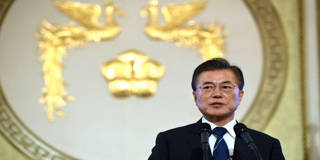South Koreans are now focused less on developments in North Korea and more on their own economic concerns. Addressing those concerns – and thus ensuring continued support for inter-Korean cooperation – will require practical solutions to structural issues, not more redistributive policies.
SEOUL – Since taking office in May 2017, South Korean President Moon Jae-in has worked hard to secure a détente on the Korean Peninsula. He has met with North Korean leader Kim Jong-un three times this year, and agreed to convert the Korean Armistice Agreement into a full peace treaty, improve inter-Korean exchange and cooperation, and work toward “complete denuclearization” on the peninsula. On the economic front, however, Moon has been less successful. And that weakness is increasingly undermining his leadership.
South Korea’s economy is struggling because its dependence on exports leaves it vulnerable to rising risks in major external markets – in particular, the United States, with its protectionist policies, and China, where growth continues to decelerate. Already, major export industries – including shipbuilding, steel, automobiles, and even mobile phones – are rapidly losing competitiveness vis-à-vis Chinese producers. Domestic industries are also hampered by weak productivity growth, inadequate labor-market efficiency, and the gulf between the country’s chaebols (family-owned conglomerates) and smaller firms.
Rather than address the structural problems afflicting South Korea’s economy, however, Moon has focused on redistribution. His signature economic policy, “income-driven growth,” aims to use minimum-wage hikes – 16.4% in 2018 and 10.9% in 2019 – to boost domestic consumption by channeling more money to low-income households.

SEOUL – Since taking office in May 2017, South Korean President Moon Jae-in has worked hard to secure a détente on the Korean Peninsula. He has met with North Korean leader Kim Jong-un three times this year, and agreed to convert the Korean Armistice Agreement into a full peace treaty, improve inter-Korean exchange and cooperation, and work toward “complete denuclearization” on the peninsula. On the economic front, however, Moon has been less successful. And that weakness is increasingly undermining his leadership.
South Korea’s economy is struggling because its dependence on exports leaves it vulnerable to rising risks in major external markets – in particular, the United States, with its protectionist policies, and China, where growth continues to decelerate. Already, major export industries – including shipbuilding, steel, automobiles, and even mobile phones – are rapidly losing competitiveness vis-à-vis Chinese producers. Domestic industries are also hampered by weak productivity growth, inadequate labor-market efficiency, and the gulf between the country’s chaebols (family-owned conglomerates) and smaller firms.
Rather than address the structural problems afflicting South Korea’s economy, however, Moon has focused on redistribution. His signature economic policy, “income-driven growth,” aims to use minimum-wage hikes – 16.4% in 2018 and 10.9% in 2019 – to boost domestic consumption by channeling more money to low-income households.